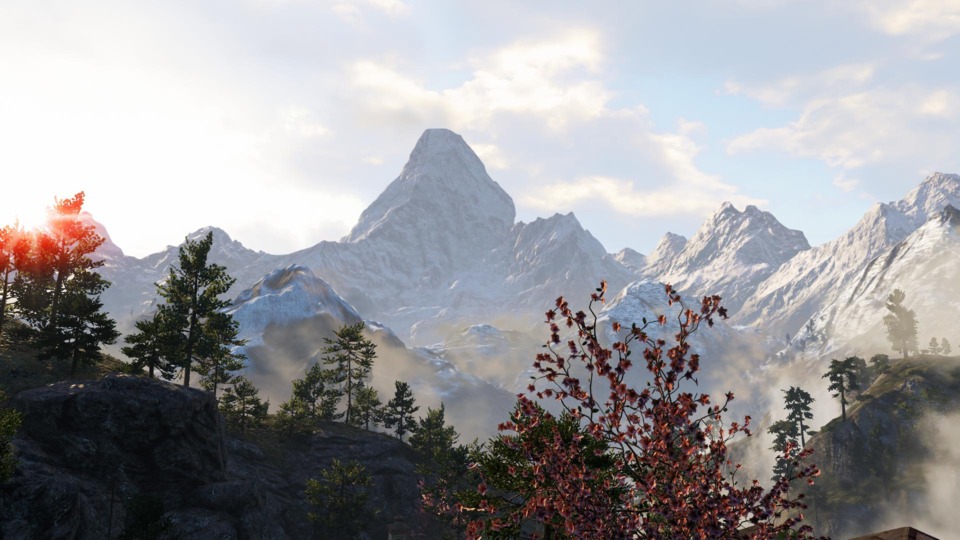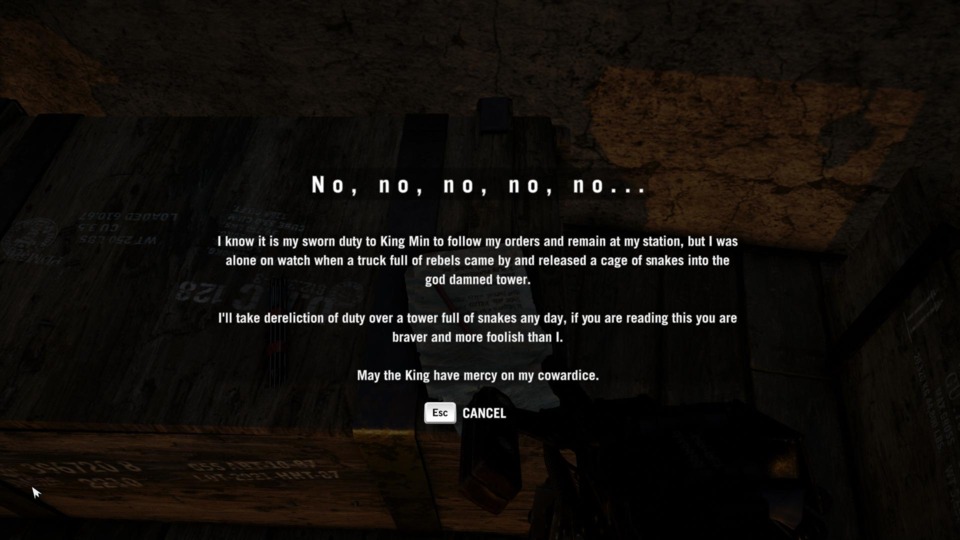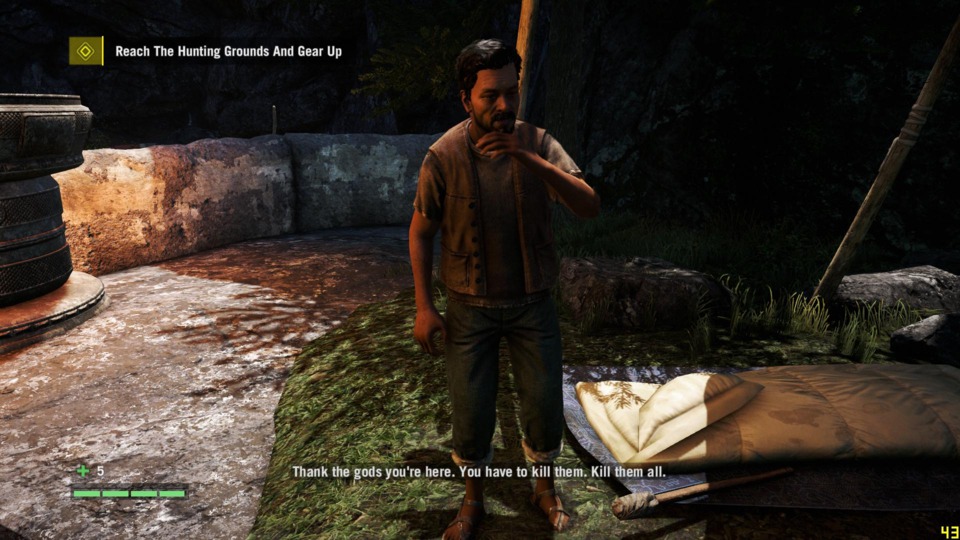Far Cry 4: Why am I playing this game?
By Gruebacca 1 Comments
(This piece goes in-depth about Far Cry 4 and contains major spoilers. If you care to not know, I advise you to complete the game before reading this.)

There is a group of video games out there that make an attempt to stir up some meta-discussion about the medium of video games. Games like Bioshock, Hotline Miami, Spec Ops: The Line, and The Stanley Parable have all contributed to discussion about what video games are, why they are what they are, and why we play them. After playing Far Cry 4 to completion, I am surprised to say that I can add it to the list, and the 'surprise' factor is definitely part of its notability.
Anyone who has played Far Cry 3 knows that it is a quality product. It streamlined Far Cry 2 in a way that made it exciting and fresh. Anyone who has played 3 also knows that it has an awful, awful, horribly offensive, piece of fucking trash story that sours the strong start it may have had and even nearly ruins the whole experience, were it not for the gameplay being pretty solid. It's a testament to that amazing gameplay, therefore, that I was willingly gleeful at the chance to play what is essentially more of the same, even if it meant the possibility of another dreadful plot. No matter; I already made my peace with the game.
I played Far Cry 4 because it is fun to play. It's fun to sneak up on an outpost, scout it out, and devise the best strategic (or most awesome) way of taking out guards and claiming it under my control. It's fun to run around a nice-looking environment and seeing what nonsense may happen. It's fun to level up, acquire new stuff, and upgrade my attributes. Putting it frankly, it's the game, stupid, and any resemblance of a story that the game bothers to include is simply an excuse to allow me to have fun. Little did I know that the story would have it's own kind of fun playing with that excuse.
The story, for those of you who care to know, centers around one Ajay Ghale, an American born in his native country of Kyrat, who's come to honor his mother's dying with by scattering her ashes in Lakshmana, presumably somewhere in Kyrat. Of course, this doesn't go according to plan, and Ghale ends up being kidnapped by ruler of Kyrat Pagan Min, a self-stylized despotic monster. Min sits Ghale down to dinner for a cordial chat, but then has to leave to answer a phone call. Min has plans for Ghale, but before Ghale learns of what those entail, he escapes with the help of the Golden Path, the resistance that has been fighting Min and his army for nigh the past 30 years. Ghale, being the son of the late leader of the resistance Mohan Ghale, is seen as a pivotal player in the civil war. He meets up with two rebel commanders, Amita and Sabal, who both wish for the downfall of Pagan Min but have very different ideas about how to pursue that goal as well as about how the country should be run afterward.
Past this point, the story receives less attention. You do whatever it is you do in Far Cry games, and the story injects itself every so often. You'll encounter a vast variety of others along the way, some of them very annoying and dislikable, as is par for the course for a Far Cry game. Everything is thrown at you. As you become adept at killing Min's forces, everyone in Kyrat comes to rely on you to get the job done. Many characters need your help in solving problems. Someone wants revenge for the animals that ate his family. Another needs you to quest for blood diamonds to repent for past crimes. A couple of stoners want nothing more than for you to test their new drugs out. All of Kyrat is depending on you to tear down as many propaganda posters, gain as much Karma, and rescue as many hostages as you possibly can. In short, it's a video game, and you're the star of the show.

It seemed funny to me, therefore, that the character of Ajay Ghale comes across as the most bored, uninteresting person imaginable. All of his lines are delivered in a nonchalant way as if Ghale had gotten out of bed minutes prior. It's like he doesn't care about the situation he's in, and furthermore, it seems as though he doesn't even care about what he's doing or how he even ended up in this mess in the first place. He doesn't say much of anything interesting either. I swear that 90% of his dialogue consists of “What's the problem”, “Uh”, and “I'll take care of it.” He's a robot doing everybody's chores for them!
It's stark, then, that Ghale continues to quest out in search of killing bad guys and upgrading his equipment to be the best there is. Much of the game is spend on Ghale killing soldiers and animals, collecting collectables, and such selfish endeavors in order to make himself more powerful. It just so happens that the things Ghale does benefit the Golden Path, the group he's working for. Amita or Sabal will even remark over the radio what a good job you're doing for the resistance. That begs the question: why does Ghale do?
Even Ghale seems confused sometimes. A good example of his confusion is evident in a series of side quests where he helps a couple of stoners test out their drugs. He does this not once, not twice, but four times! These drugs are insane too! He gets put out and wakes up in a hostile trippy world where he could possibly die with a higher chance than normal on the count of enemies popping out of nowhere, random free falls, and statues rising out of lakes. It's the definition of a bad trip, and Ajay willingly pursues this four times?! Even Ghale doesn't know why he's doing this. He just does! Now these are optional missions not required to complete the game, unlike most missions involving a letter-shaped icon on the map. Ghale doesn't have to do this. He doesn't get any substantial rewards for each quest, and he doesn't even get anything cool at the end of it all unlike most sidequest branches. There is no good reason to do this, but should the player want to, they can direct Ghale to complete these missions anyway. After all, it's something to do, right? Far Cry 4 has absolutely no shortage of things to do.
I'm sorry, what was the point of all this anyway? Let's not lose track here. I can use that as a metaphor, actually, for my time with the game as I was having enough fun playing it to forget why Ghale was in Kyrat in the first place. It wasn't until about 2/3rds of the way through the game, about the time you first enter the northern half of Kyrat, that I remembered the purpose of Ghale's trip to Kyrat: spread his mother's ashes in Lakshmana. And then I thought, "How funny that in order to do so, he has to single-handedly wipe out the military of an entire country and cut the head of their totalitarian leader!" It's nothing new in video games, of course. Most shooters give a flimsy reason as to why dude with a gun must kill people, and do a very good job at it to boot. By this point in the game, the story gets more interesting and begins hint that it will play with that trope.

With the successes of the Golden Path ensuring an unstoppable path to victory, the rivalry between Amita's and Sabal's factions becomes much worse to the point that they are refusing to compromise on anything. (A metaphor for US government perhaps? I digress.) Many missions before had Ghale choose one person's mission over another, but the final straw that changes everything is reflected in a mission to either preserve or destroy a major Kyrati temple. After this mission, Amita or Sabal will take full control of the Golden Path and will then send you out to actually kill the other. These characters were once bitter but rational, but with the opposing interest group losing power, the winner becomes an extreme tyrant, making Ghale doubt that the people he was fighting for were much of good guys to begin with. (Hint: they aren't.) If the Golden Path aren't good guys, and Pagan Min certainly isn't a good guy, then who's the good guy? Is Ghale the good guy?
Pagan Min, of all people, has his own answer to that question. I'll summarize the ending of the game here. A final assault on Min's palace ends in victory for the Golden Path, and Ghale gets to decide Min's fate himself. Min then cordially invites Ghale to yet another dinner for a civilized chat. Ghale can choose to muder Min on the spot, or he can accept Min's request. If Ghale spares Min, then Min lectures Ghale about what happened the time Min kidnapped him. Min, before he left for a phone call, told you, “STAY here. ENJOY the crab rangoon. DON'T move.”
Now, if I was Ghale, and I was kidnapped into some place I've never been by some horrible person, I'd think it most reasonable to follow his advice. I'd be too scared to wander around the mansion for a way to escape just yet. Because this is a video game, however, I chose to wander around until I found something important: a man getting tortured and then the Golden Path busting me out. The video game wouldn't reward me for sitting there doing nothing, right?

It, in fact, does. It doesn't matter if you play through the game like a normal person would or if you refuse to touch the controller again after pressing the start button, the game ends in the same way. This secret ending can be activated by doing nothing at the start of the game. You don't have to kill any soldiers or help out any rebels or do any random person's dirty laundry. You can, if you want to, however; it's a video game, but does it even qualify as a video game if it can end before you start playing it?
Anyway, whether I followed Min's advice in the first minute of the game, or I spared his life in the last minute, Min will follow up with this next: he will actually allow me to do what I set out to do in the first place. Seriously, Min has no problem with this. He reveals the plot twist of the game, that Lakshmana isn't a place, but is rather the daughter of Pagan Min and Ajay's mom. Min tells the story about how Ajay's father sent his wife to spy on Min, where she ended up falling in love with Min and having a kid. Ajay's father, upset about this, ends up killing Lakshmana, a baby, in rage, and then he ends up being killed shortly after by Ajay's mom. At some point, Ajay and his mom left for America, which deeply upset Pagan Min. Thus, it is revealed that Pagan Min's reasoning behind him being the most immoral monster of a tyrant is that the Golden Path killed his daughter, and he wants revenge.
Again, nothing new of video games to have flimsy excuses for villains to be bad. What is new is that Pagan simply doesn't care. He knows it's a bad excuse, and is simply using it as a crutch to do whatever he wants. He then lets Ajay know that his bad excuse to kill people is probably as pathetic as Ajay's excuse to kill people. You know what? After what I experienced in this game, I kind of agree with him.
Pagan Min is the worst kind of monster: the kind that knows it is a monster and is lovingly willing to show it off to everyone else. Min is essentially asking you, the player, if you can accept that you are a monster too. It becomes easier to accept this when you return to Kyrat and find Amita or Sabal dragging Kyrat back into dark times. This is Ghale's fault, by the way. It's your fault too. In fact, I think it your fault way more so than it is Ghale's fault. I don't think Ghale is much of a human being to begin with given how boring he is. Hell, his last line of dialogue is "Fuck you!" He might as well be you, or be me. I was the boring, nonchalant person the whole time, rolling my eyes at the story elements I judged to be clichéd nonsense getting in the way of my fun. Pagan Min was talking to me; no wonder Ghale was so silent for much of the game. And, just why was I doing those drug missions I mentioned earlier anyway? I don't know. I guess it's because I could. I wanted to see what would happen.
If there's any solace to be found in Far Cry 4, it's that there are actual good guys to root for in the game. You'll find them in the side missions that involve you protecting a truck with supplies en route to its destination. The ordinary soldiers of the Golden Path have good intentions with these missions. One has you protecting a truck delivering books to secret libraries across Kyrat so that the people can be literate. Another truck is part of a mission to take Kyrati cultural items across the border so that it can not only be sold to fund the revolution, but give the rest of the world some knowledge of Kyrati culture, knowledge that Pagan Min or Amita and Sabal would have rather melted down or destroyed for their causes. These ordinary people are the real heroes of Far Cry 4, and I can say with pleasure that giving ordinary NPCs the moral high ground is a relatively new thing of video games to do.
I learned some things about Far Cry 4. I first learned that this isn't a story of morally gray faction 1 vs morally gray faction 2, as I first expected. This is actually a story of morally black faction 1 vs morally black faction 2, with you playing for faction 1 and Pagan Min playing for faction 2. Pagan Min is bad, Amita and Sabal are bad, your father was bad and pathetic, and you're bad too. I also was reminded that you don't have to play as the good guy in a video game. This game reminded me a lot of Spec Ops: The Line, another game where the protagonists actions actually make everything worse. The difference between Spec Ops and Far Cry 4 is that with Spec Ops, I was expecting a deep story to tackle such themes. With Far Cry 4, I didn't expect it until a few minutes before the credits rolled. It was a complete surprise, especially with the memory of 3 still ingrained. I think that's more remarkable, actually. Going in expecting one thing and coming away with another can be more powerful sometimes.
The way 4 turned out has me excited to see what Far Cry 5 is going to be. (Oh, I'm sure they'll make another one.) Do they try to make a game that keeps in mind what happened in 4's story? Or, do they just make another dumb shooter just like 3 and 4 were? If the latter is the case, that'd be incredibly disappointing, even more so that 5 has a chance to finish the discussion about morality that 4 started. I hope 5 ends up being different from 4, both from a gameplay perspective and a story one as well. 4 set up such a high bar for 5, but it's almost impossible to know what changes they could make to keep the series fresh while still adhering somewhat to the core of what makes Far Cry games fun. These high expectations are doubly so now that 4 has made the Far Cry series a bit self aware.
I'm still not sure if the overall story of Far Cry 4 is any good. If placed in a medium other than video games, the story would be forgettable trash because aspects of the story require that the video game be a video game. I still have issues with the way certain things are portrayed (especially in regards to some awful characters), but I can say that better so than the average video game, Far Cry 4 has given me something to think about, and if you played it as well, I hope it gave you something to think about too.
To sum it all up, Far Cry 4 asks you if you enjoy playing video games. To that I say, "Yes. I enjoyed playing this video game too." To answer the question in the title of this article, it's because it's fun.
